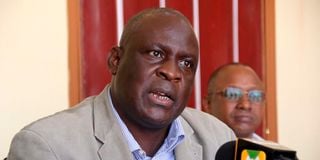Kuppet wants President William Ruto team on education reforms disbanded

Kenya Union of Post-Primary Education Teachers National Chairman Amboko Milemba during a past media briefing.
The Kenya Union of Post Primary Education Teachers (Kuppet) has called for the disbandment of the Presidential Working Party on Education Reforms (PWPER) accusing it of causing confusion in the implementation of junior secondary school (JSS).
The secretary-general of the union Akello Misori also called for a crisis meeting to resolve issues surrounding the JSS, saying that no learning is going on in schools since they opened on January 30 2023. Specifically, the union wants JSS to be taken back to secondary schools as earlier planned.
“Keeping these learners in primary schools any longer than the next school holidays would be tantamount to wasting their entire academic year. When you have learners who are going untaught, you’re creating more psychological torture to them than if you even suspended the current learning for two to reorganise for a proper transition,” he said.
He claimed that government officials are afraid of reporting the true position out of fear. A spot check by Daily Nation two weeks ago indicated that many public schools were struggling to implement the curriculum and are poorly staffed.
“Opinion poll rather than expert advice informed the decision to domicile JSS in primary school. The team’s cardinal mistake was to deviate from the CBC implementation plan that had guided the new curriculum for five years, without thinking through their recommendations.
“It is not too late for the government to domicile JSS in secondary schools. In anticipation of this transition, the State Department for Early Learning and Basic Education had invested massively in addressing some of the shortfalls that have emerged,” Mr Misori said during a press conference at the union secretariat.
“Feedback from county education offices indicate that public servants including senior officials at the Ministry of Education and the Teachers Service Commission (TSC) are cautious in reporting this crisis for fear of going against the grain,” he added.
He accused the PWPER which is chaired by Prof Raphael Munavu of ignoring research when they recommended that JSS be domiciled in primary school.
“The primary schools where JSS is domiciled lack the critical infrastructure for JSS, including laboratories, libraries, and facilities for extracurricular activities. Whereas the Guidelines for Implementation of Junior Secondary Education provide a path for the development of such facilities, that process will take time, depriving current learners of the quality education they deserve,” Mr Misori said.
The chairperson of Kuppet Omboko Milemba said that the main problem has been lack of teachers for JSS in primary schools. The Teachers Service Commission last month deployed 30,000 teachers to teach JSS but most schools got one teacher.
Mr Milemba said the teachers are overwhelmed since they have a huge workload of 14 subjects, a situation he said would be addressed by taking the learners to secondary schools which are relatively better staffed.
“The most important aspect is human resource. We can take learning outside the classrooms as long as there are teachers. In any case, over 10,000 classrooms were put up in the last two years,” he said.
He said that according to the curriculum based established (CBE) that is used to staff secondary schools, 70,000 more teachers are required and that it would take about four years to optimally staff JSS.
Mr Misori dismissed fears about the age of learners in JSS, arguing that there are huge differences in both primary and secondary schools and that the majority of learners attend day schools.
The term of the PWPER ends at the end of this month when it is expected to hand in its final report to President William Ruto.





